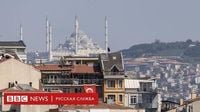On April 23, 2025, Istanbul experienced a significant earthquake measuring 6.2 on the Richter scale, according to the Turkish Disaster and Emergency Management Authority (AFAD). The earthquake struck at 12:49 local time, with its epicenter located in the Sea of Marmara, approximately 80 kilometers west of the city, at a depth of about 7 kilometers. This seismic event has been described as one of the strongest to hit the region in the last 25 years, affecting a city with a population of over 16 million.
The tremors were felt not only throughout Istanbul but also in neighboring provinces and even as far away as the capital, Ankara, and Sofia, Bulgaria. Initial reports indicated that the first tremor occurred earlier in the day at 12:13, registering a magnitude of 3.9. Following the main quake, a series of aftershocks ensued, with the strongest recorded at a magnitude of 5.9. By 15:12, authorities noted that there had been over 50 aftershocks throughout the day.
Interior Minister Ali Yerlikaya confirmed that 151 people were injured, primarily due to panic-induced injuries, such as jumping from heights as residents rushed to evacuate buildings. Fortunately, there were no fatalities reported. The Governor's Office of Istanbul stated that although an abandoned building in the Fatih district collapsed, no injuries resulted from this incident.
In the aftermath of the earthquake, many residents reported disruptions in cellular communication and internet services, which added to the chaos as people fled their homes. Videos circulating on social media showed crowds gathering in the streets, with individuals visibly shaken by the experience.
Despite the panic, the authorities reported no significant structural damage to residential or administrative buildings, nor to vital infrastructure such as highways, airports, and public transport systems. The Turkish media outlet Yenisafak cited officials from various departments who confirmed that there were no adverse effects on energy supplies, gas infrastructure, or water services.
President Recep Tayyip Erdogan convened an emergency meeting at the operational headquarters later that evening, assuring the public that the situation was being monitored closely and that no lives were lost as a result of the earthquake. He emphasized the importance of remaining vigilant and avoiding potentially damaged structures.
Experts have warned that the region remains at risk for future seismic activity. Naci Görür, a well-known Turkish geologist and earthquake expert, indicated that the aftershocks are indicative of increased stress along the Kumburgaz fault line, which runs through the Sea of Marmara. Görür, who previously predicted the devastating earthquakes that struck Turkey and Syria in February 2023, noted that the current seismic activity could potentially lead to a stronger earthquake in the near future. He has previously forecasted that Istanbul could face a major quake with a magnitude between 7.2 and 7.6.
Geologist Okan Tüysüz echoed these concerns, stating that the current aftershocks should not be taken lightly and that the possibility of a primary earthquake still looms. The Research Center for Geophysics in Potsdam has also acknowledged the potential for a more powerful tremor in the region soon.
As Istanbul grapples with the aftermath of this recent quake, questions about the city's preparedness for such natural disasters have resurfaced. The densely populated metropolis is often criticized for its lack of adequate earthquake readiness, with many residents not receiving SMS alerts about the earthquake, despite an existing notification system.
In light of these events, residents are urged to remain cautious and to avoid entering buildings that may have sustained damage. The Turkish authorities continue to assess the situation and provide updates as necessary. As Istanbul is located at the intersection of tectonic plates, the threat of earthquakes is a persistent reality for its inhabitants.
This earthquake serves as a stark reminder of the natural forces that can impact urban life and the importance of preparedness in mitigating the effects of such disasters. While the immediate danger may have passed, the potential for future seismic events remains a concern for both officials and residents alike.






